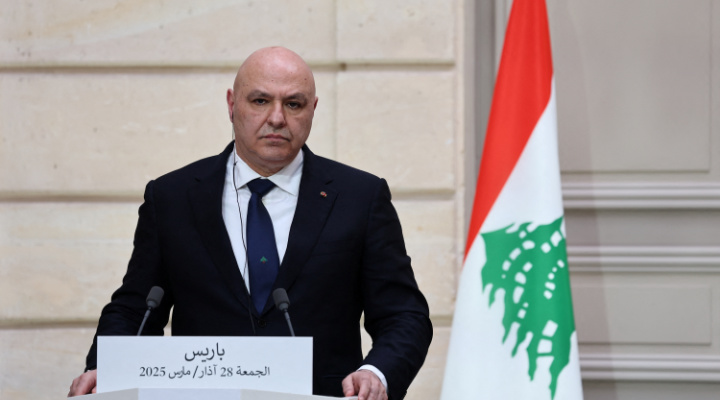Lebanese President Joseph Aoun attends a joint press conference with French President Emmanuel Macron at the Elysee Palace in Paris, France, March 28, 2025. REUTERS/Sarah Meyssonnier/Pool
Lebanese President Joseph Aoun on Friday carefully affirmed his country’s desire for peace with Israel while cautioning that Beirut is not ready to normalize relations with its southern neighbor.
Aoun called for a full Israeli withdrawal from Lebanese territory, according to a statement from his office, while reaffirming his government’s efforts to uphold a state monopoly on arms amid mounting international pressure on the Iran-backed terror group Hezbollah to disarm.
“The decision to restrict arms is final and there is no turning back on it,” Aoun said.
The Lebanese leader drew a clear distinction between pursuing peace and establishing formal normalization in his country’s relationship with the Jewish state.
“Peace is the lack of a state of war, and this is what matters to us in Lebanon at the moment,” Aoun said in a statement. “As for the issue of normalization, it is not currently part of Lebanese foreign policy.”
Aoun’s latest comments come after Israeli Foreign Minister Gideon Saar expressed interest last month in normalizing ties with Lebanon and Syria — an effort Jerusalem says cannot proceed until Hezbollah is fully disarmed.
Earlier this week, Aoun sent his government’s response to a US-backed disarmament proposal as Washington and Jerusalem increased pressure on Lebanon to neutralize the terror group.
While the details remain confidential, US Special Envoy Thomas Barrack said he was “unbelievably satisfied” with their response.
This latest proposal, presented to Lebanese officials during Barrack’s visit on June 19, calls for Hezbollah to be fully disarmed within four months in exchange for Israel halting airstrikes and withdrawing troops from its five occupied posts in southern Lebanon.
However, Hezbollah chief Sheikh Naim Qassem vowed in a televised speech to keep the group’s weapons, rejecting Washington’s disarmament proposal.
“How can you expect us not to stand firm while the Israeli enemy continues its aggression, continues to occupy the five points, and continues to enter our territories and kill?” said Qassem, who succeeded longtime terrorist leader Hassan Nasrallah after Israel killed him last year.
“We will not be part of legitimizing the occupation in Lebanon and the region,” the terrorist leader continued. “We will not accept normalization [with Israel].”
Last fall, Israel decimated Hezbollah’s leadership and military capabilities with an air and ground offensive, following the group’s attacks on Jerusalem — which they claimed were a show of solidarity with the Palestinian terrorist group Hamas amid the war in Gaza.
In November, Lebanon and Israel reached a US-brokered ceasefire agreement that ended a year of fighting between the Jewish state and Hezbollah.
Under the agreement, Israel was given 60 days to withdraw from southern Lebanon, allowing the Lebanese army and UN forces to take over security as Hezbollah disarms and moves away from Israel’s northern border.
However, Israel maintained troops at several posts in southern Lebanon beyond the ceasefire deadline, as its leaders aimed to reassure northern residents that it was safe to return home.
Jerusalem has continued carrying out strikes targeting remaining Hezbollah activity, with Israeli leaders accusing the group of maintaining combat infrastructure, including rocket launchers — calling this “blatant violations of understandings between Israel and Lebanon.”
The post Balancing Act: Lebanese President Aoun Affirms Hope for Peace with Israel, Balks At Normalization first appeared on Algemeiner.com.
Click this link for the original source of this article.
Author: Ailin Vilches Arguello
This content is courtesy of, and owned and copyrighted by, https://www.algemeiner.com and its author. This content is made available by use of the public RSS feed offered by the host site and is used for educational purposes only. If you are the author or represent the host site and would like this content removed now and in the future, please contact USSANews.com using the email address in the Contact page found in the website menu.








